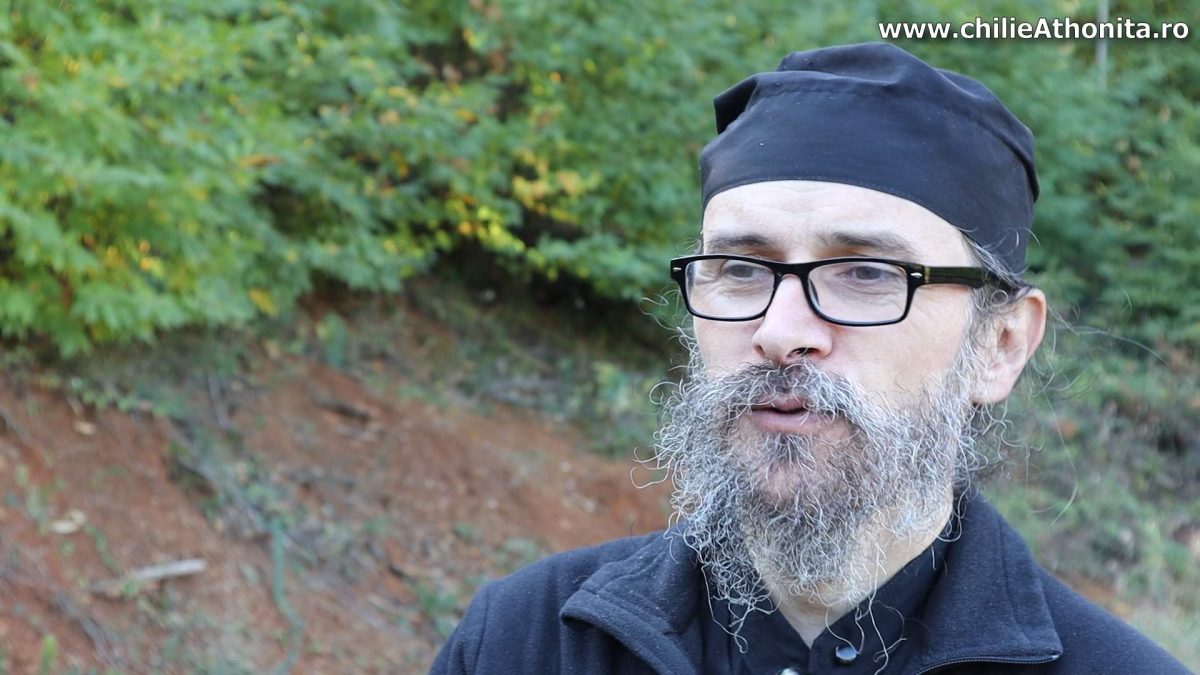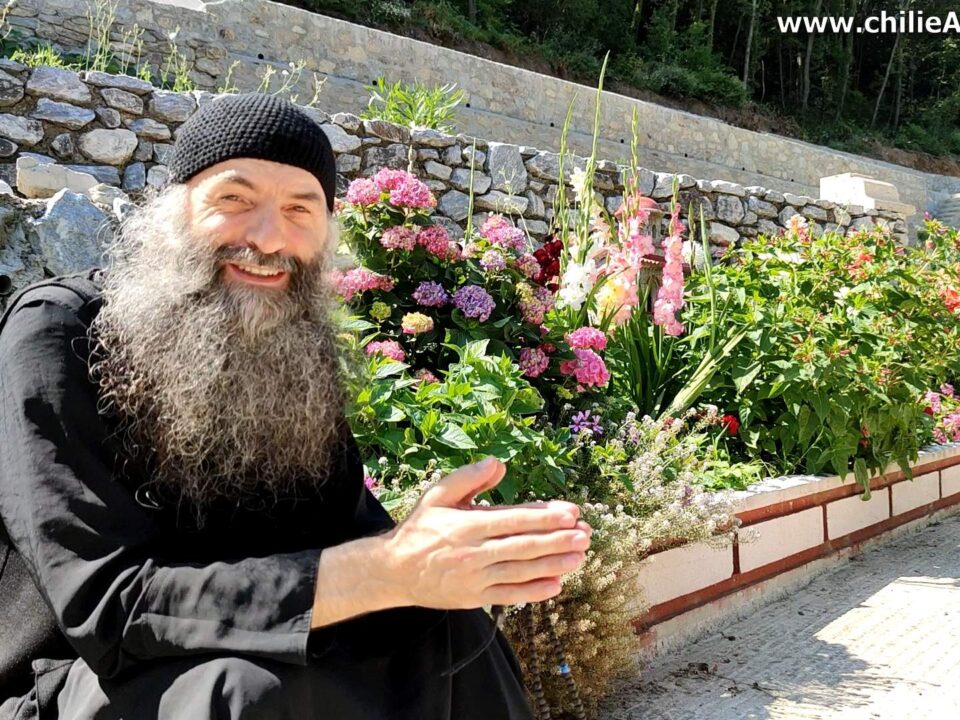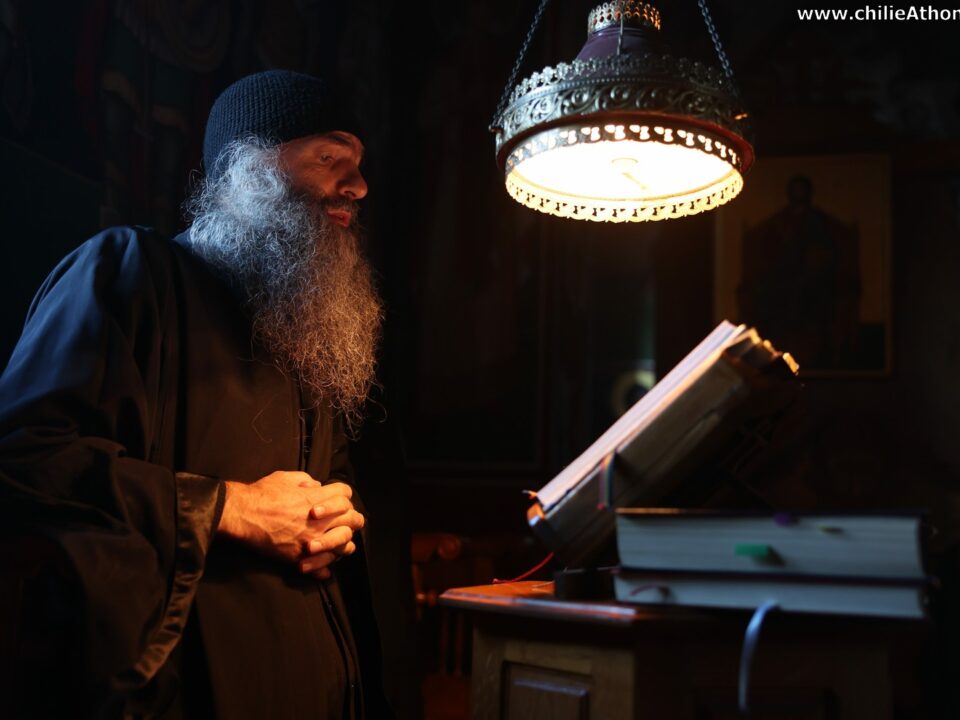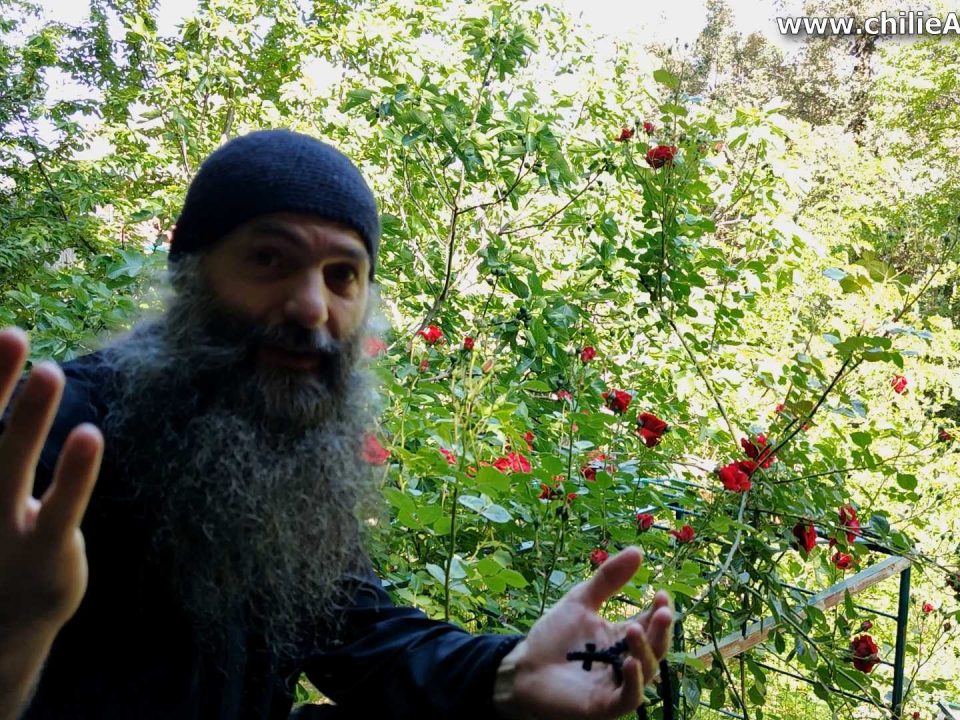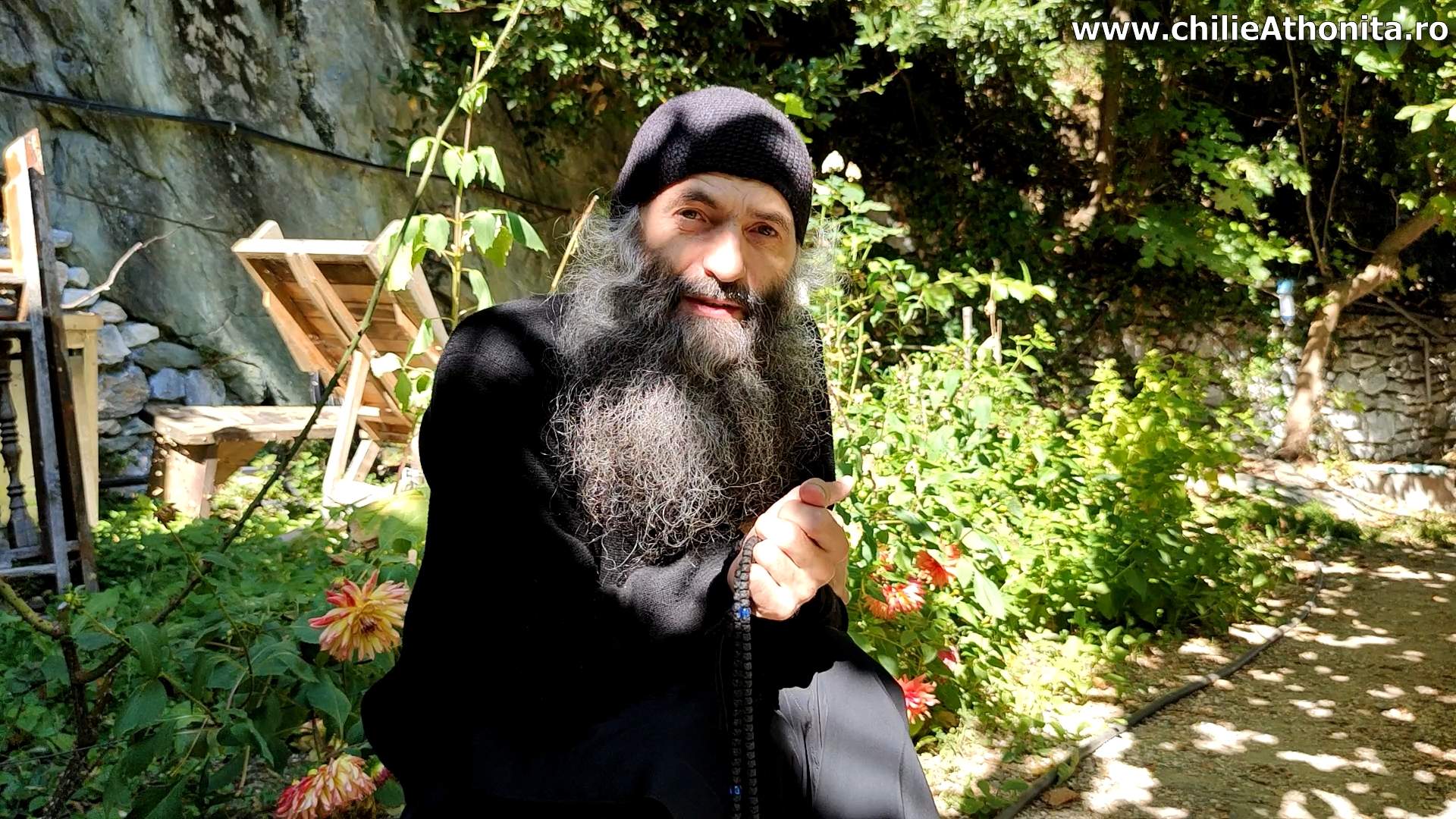
Saint Paisios: Life, Miracles – Father Pimen Vlad
27 October 2022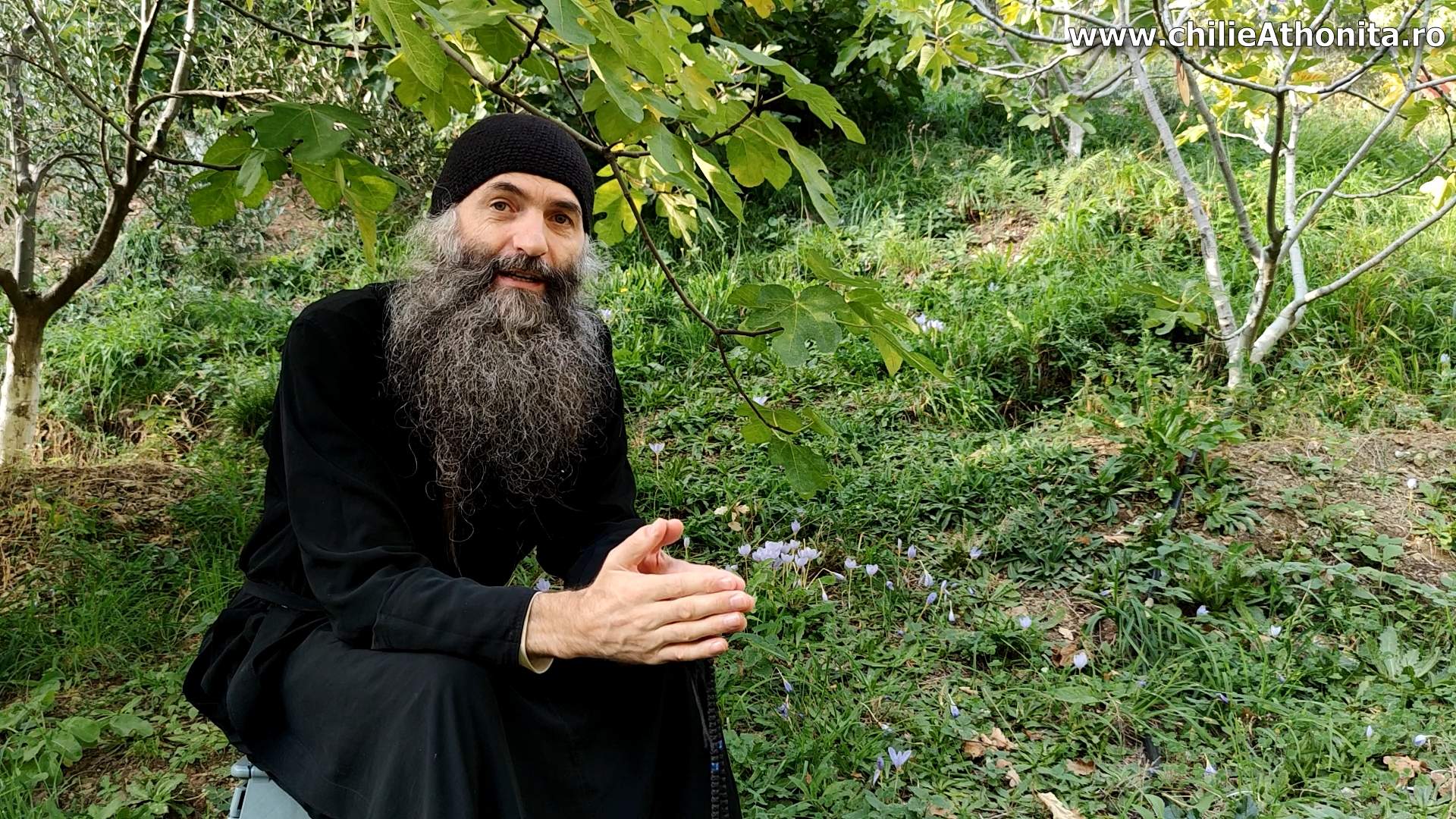
Aviation Miracles – Father Pimen Vlad
3 November 2022What are the stages of meekness? What is the relationship between meekness, anger, and war? How do we acquire meekness? What are the characteristics of meekness? What about of anger? What is war and how does one get to it?
You will find the answers to all these questions by watching this video.
Enjoy!
Glory to the Father and to the Son and to the Holy Spirit now and forever and unto the ages of ages. Amen. Through the prayers of our Holy Fathers, Lord Jesus Christ, Son of God, have mercy on us. Amen.
We talked about joyful crying and said that the water of crying softens and breaks the stone of the heart. So now we should talk about meekness and lack of anger as a natural consequence of this. Of course, we are much more familiar with anger—with getting angry, because we are a society of war, brothers, of hatred, of distance from God. But our goal, brothers, is not to win the war. Our goal is to win peace.
You know, because every man wants to be God—of course without God, yes, [that’s] a whole story, and that’s the fall of Adam, actually—the main cause of this war is war between heresies, that is, war, dispute, quarrels between different wrong opinions, between wrong roads to God that someone, however, considers right or even considers that they are his gods. Meaning, he’s bent on it, he’s stuck there. And these dead gods, who beget death, division, idols that is, such as [the idol of] money, wealth, power or in other words, pleasure, affluence, power (PAP) – the material and what is connected with it, these are the idols that make us go to war. In fact, war is always within us, and we go deeper because we get closer to these idols – power, pleasure, and affluence.
The solution, here, brothers, is NOT atheism because atheism is the most dangerous heresy, the most dangerous mistaken belief – that is the belief in oneself, the belief in one’s own thought that induces maximum division: head-on division between individuals. It is about egoism that is the backbone of the old man and the road to hell.
All this generates the misuse of the incensive part – that is, what today we call anger, the attack on others. We need to know that this anger is utterly destructive within us—we can destroy anything if we use it to the fullest – within us, that is. But the enemy urges us to destroy within ourselves our brothers and sisters who are one with us – and, if we consent to this, then to destroy them in real life as much as possible. No, brothers, not like that!
This almighty force, this inner anger, was given to us by God to destroy evil thoughts, to destroy the distortion within us, to analyze the facts and to correct them. And when we see a bad thought coming, we don’t doze like a fussy walrus. But as soon as the thought comes – bam – it’s out! We don’t receive it! You won’t accept it! So we use anger against thoughts, not against people.
The only person we turn our anger against is ourselves (myself). We say [to ourselves], “Hey, pig, aren’t you ashamed? Calm down! Do not receive such thoughts! Are you a Christian?” That’s what Father Joseph taught us, understand? So let us never turn against persons, but always against sin, against the distortion that first of all resides in us, and through this distortion we see others. The only person we should turn our anger against is ourselves (our sinful self).
Have courage, it will not kill us – on the contrary, we will become alive; we will make ourselves alive and sons of God the Most High. Yes, brothers, because if we get angry against others, against people, that’s a form of civil war. Understand? And as someone said, what can be civilian in a war? As I have said many times, we as individuals must all be together against problems, together brothers. That is, to be my child and I, my life partner and I, my spiritual child and I against problems. And not me against my child with his problems, or me against my spiritual child or my wife or my husband.
Understand? But we both have to be against the problem, to see how to solve it. That is, not the destruction, the killing of the sinner, but the improvement of the situation, the improvement of the process. There has to be a positive approach, brothers.
As you see, brothers, meekness has nothing to do with wimpiness, with existential stagnation, but on the contrary it is a very active, very watchful state through which we minimize war, breakage, tearing, and increase the peace and harmony that is the natural state of the soul. Understand? The meek soul is a work of art, brothers. An extraordinary work of art full of joy. The soul knows this and seeks to do everything possible to maximize this uncreated energy of God’s love, God’s grace within itself.
Because of this, brethren, lack of anger is the insatiable desire for humility, for dishonor because humility unites while praise, pride, vainglory are forms of breakage, of death – they lead to hell. We know very well that pride is the greatest passion. It threw the devil out of heaven.
So meekness is the motionless state of the soul in a deep peace that remains the same in dishonor and in praise. The meek man has the consciousness of his eternity, which he acquires as a gift from God, and he no longer deals with worldly things except as strictly necessary things, and these on the margins of his existence. Meaning, it doesn’t touch his heart. His heart is in eternity with Christ. It is motionless with a stillness above all rest and movement – as St. Dionysius the Areopagite and St. Maximus the Confessor say. A living stillness and not a frozen stillness, not death. A smooth activity like that of a falcon gliding up high.
You know, if we occupy ourselves with evil, evil increases. We’re troubled and it’s not good. If we occupy ourselves with the good, the good increases. Let us not look for evil in people, brethren, for we shall find it. Let us seek the good, and we will find that too. Understand? Let’s have a good thought. Let’s do everything to minimize war, let’s not let war break out within us. Because we are a civilization of war and not peace. Let’s not forget that wars do not begin, but they actually break out from the depths of us, from the depths of our distortion. It is the outburst of hidden hatred, of remembering evil. Understand?
Anger is the desire to harm the one who has offended us—whether it’s against God’s will or even doing God’s will. If we become bent on that, God forbid! Wrath, impulsivity is the instability of the soul’s powers (parts) and lack of soberness of the soul. Unfortunately, this is very much seen in today’s young people, it is a characteristic that is found everywhere. Understand? Because this, unfortunately, is maximally enhanced by the online environment and by everything that modern electronics mean, i.e. social networks, cellular applications and so on – because their target is to darken the mind, to minimize going deeper within ourselves and the depth in our thinking. It seeks human superficiality and the shortening of the attention span to the maximum. That’s what they want to do to us, brothers. Understand?
That’s why we have to do just the opposite. Meaning to stop. Stop, brothers! Stop! The first phase, the first step against anger, impulsivity is precisely this stop, brothers. That is, not to open our mouths when we are angry. “[Hold] water in your mouth,” as Fr. Abbot Pimen says. Howl in the bag, brothers. Go to the bathroom. Do not escalate conflicts. Do not generate disturbances – do not increase the tearing, do not generate chain reactions because in this way we crumble, we pulverize ourselves both as persons and as civilization. Understand?
Let us be wise, brethren, slow to talk, as St. James says, and quick to listen. If we talk a little, our words will be much more heard, brothers. St. Isaac the Syrian says that “Many times that I have spoken I have repented, that I have been silent, never.” Understand? Of course, this should not be a sign of depression and inferiority complex, but of love for God and people. Let us enjoy silence because sometimes words are a form of violence. Someone said, “Enjoy the silence, words like violence.”
If we proceed in this way, the second stage is the stillness of thoughts, when the soul is troubled a little bit, shallowly. You know, there’s a ripple of sadness, like the fluttering of a bat. In that moment, let us not forget that we are all sinners and that Christ loves us all. Let us not forget our eternity and forget everyone above all else. We must forget everyone and simultaneously consider them within us above all else. So if that image from the devil, full of hatred against our brother, comes back to our minds, we must forget. And we forget the moment we remember our eternity, God’s love, and that we consider others above all else. Understand?
That of course doesn’t mean we are at the will of everyone. No way. The mind must be tense in a rest above all movement, enlightened and strong to stand according to God’s will. If, for example, people want to take us away from God, from our schedule, we will not accept this, even if our soul vibrates a little — you know, like how a cell phone vibrates. As I said, meekness is not wimpiness.
But do you know what happens? Just as darkness recedes at the appearance of light, so humility by its delicacy causes all bitterness of anger, all wrath, impulsivity, all confusion in our minds to perish. It goes away like a mist, you know. Such is meekness: like the sun with its gentle rays emerging from the clouds.
During this period we must be aware that anger is very sudden and sometimes comes unexpectedly triggered by a trigger – by a situation, by a person, by an event. Then we have to be careful, as I said, because this is like a quick move that can break many pots in the blink of an eye, as with bowling pins. While a gentle movement can bring – the pots and bowling pins – to their destination.
After that, you know how it is: if the field lit up, hardly anything grows on it. But if there is repentance, the tears of repentance, then its fruits grow much better. Let us have courage to ask for forgiveness, brothers. Because if we don’t ask for forgiveness, who’s going to pay for the broken pots? We need to ask for forgiveness and not seek legalistic justice so much. This is very important. Let us rebuke ourselves and put ourselves on the bench of the accused and put ourselves in order. Understand? Let’s not say that “It doesn’t matter,” but on the other hand, let’s not fall into despair because of it.
It takes a lot of attention to the echoes of our inner hell so that it does not get out, as I said. Here a good thought also helps a lot. Let’s think about how much God loves people, including the ones in opposition, who are gnawing at us now, and think the good thought – that all people are good, but they don’t know… they can’t… it doesn’t turn out… or that they’re ill, poor them. What – are we not ill?
Let us not be lenient with ourselves and demanding of others, but vice versa. If we are lenient with others, then God will also be lenient with us. And beyond that, brothers, it is also absurd, you know: that is, if the other is sick because blood is flowing from his nose, we are full of compassion, but if he has a passion of the soul, a sin, a bad habit, then we are angry. Brothers, it’s not good.
It’s not good. I know that this is where our self-love, our selfishness that is scratched, wounded by the disease, by the passion of the other, comes into play, but our selfishness is also a passion, brothers. And it pulls us down, it pushes us down. It pushes us down badly because egoism is a great passion. Understand?
Let me give you a case of how we should behave. It was St. Poemen with his brothers. And the youngest was the humbler, the annoyer, the one who chafes, continuously. Until one of the brothers beats him up good and they fight until they smash their heads. Another comes to St. Poemen and says to him: “Don’t you see that they are killing each other?” And St. Poemen tells him, “They are brothers, they will reconcile again.” The other insists and insults him… And St. Pimen continues: “Say I wasn’t here.” Understand?
It’s about peace. It is not done with disorder. Gently. At some point, however, when they couldn’t stand that young one anymore, they said amongst themselves: let’s run away and leave him here with the whole cell just to find peace. And the brothers fled stealthily. But the young one noticed and came after them saying, “Hey, hey, why didn’t you tell me earlier to get ready?” They saw black before their eyes, brothers. Mother of God! And St. Poemen said: Let us go back, brethren, for he does not do it out of malice, but this is how he is… with some special cogs in the head and the enemy brings temptations… Understand?
So it takes meekness and attention to maintain our meekness. Well, you should know that the devils know this too, and because of that they’re going to do everything possible to dilute our attention, to break our attention. They do this also by straining us, bogging us, entangling us in worries, by putting an opposer in our side, by a series of daily temptations with this and that and the other, but also by another stratagem that we must necessarily know: the cunning devils retreat for a while, so that we neglect some great passions that we have because we consider them small, to make them incurable diseases. Meaning, saying everything is fine, we’re calm, and so on. You know what it’s like: the fox pretends to be dead to catch the chicken, right? And if the hen is not careful, the fox takes it with its feathers and everything. Understand?
That’s why we need to practice a little bit every day. Not too long that we won’t last in the end, but not too little to put our attention to sleep, because if we put our attention to sleep, then we will be like the chickens and there won’t be any feathers left on us. So how do we practice every day a little bit? You know, like a hard, jagged stone, colliding and rubbing against other stones, smooths out its rugged and hard nature and becomes round, like an egg. Likewise the jagged and rash soul, mingling with a crowd of harsh and rash people, and living with them, one of two things happens to him: either he cures his illness by patience, or, withdrawing, he knows his weakness, because this cowardly flight shows him, like a mirror, his weakness. Understand?
The real defeat is when we learn nothing from what happens to us. Even if we suffer from this uncontrolled anger, we must learn that we are full of our own will, of self-esteem. Meekness is the sign of humility. Strong will is the sign of anger.
The Holy Spirit the Comforter comes into humble hearts, brethren, and therefore into meek hearts. So nothing resists the coming of the Holy Spirit as much as anger, brethren, as wrath against persons. Now you’ll ask — then why did God give us the incensive part? He gave it to us to use it against sin, against evil thoughts, against distortion, against going out of the natural law of the flesh ordained by God. It is spiritual courage, a witness, without hating or slandering people.
I insist on this because it is very important. Because you know what happens? Sometimes we are apparently virtuous and we hold within ourselves, we hold inside ourselves until we burst out. This should not happen and in order for it not to happen, we need confession to God, to mourn in our prayer, to the confessor if we are struggling and sometimes it is good to tell the other that something bothers us, without slapping love. Understand?
That is, to say it at the right time and in the right way, that is, with humble words. I’m not going to say, “You’re to blame.” You’ll say, “It’s difficult for me to carry that… I can’t resist…but not as I want it, as you want it, as it can be, and when it is possible…” Understand? We don’t press. It is much better to confess our weakness – because this is the truth – than to accuse the other. As I said, you have to be with him against the problem and not you against him with your problems. In this way we will maintain our serenity.
You need to know that this desire to get things done, God takes it and sometimes does it in unexpected ways. For example, if we keep it within ourselves and at some point we discuss and reveal some things, then the misunderstanding is revealed, things are explained and the tension disappears, or if the relationship is sinful, it will fall apart. But we must be well-intentioned. Understand?
It will fall apart even though we may sometimes not want a relationship to end because of the sticky, dark sweetness of sin in that relationship. Brethren, let us be serene. The good Lord takes care. We may not have done wrong in that thing for which we are reproached, but we have done wrong, we have wronged, we have sinned elsewhere, and the pleasure of sin is in us. This must come out if we do not confess and repent. Understand?
Beyond that, maybe God wants to give us some exams. Understand? Because of this, we sometimes suffer reproach. So, brethren, perfection is complete serenity implanted in the breeze of unclean winds, in the breath of the storm of hatred against us. Let’s not say it’s unfair, brothers. We all deserve it and the good Lord knows.
Let us not forget, however, that for this, to suffer injustice and the onslaught of hatred – of existential distortion, of demonic energy, serious support is needed from grace, from the good God and the Mother of God. Otherwise the person goes crazy and/or backs down.
Let’s not forget that Easterners, Asians have tried and are trying to be serene – to be Zen or to reach Nirvana, depending on who we are talking about, but due to the fact that they are not in the true faith they reach or extreme harshness – I remind you that in China the national sport is martial arts, that is, the scientific way to beat up or even beat someone to death. Martial arts which are part of their religion and philosophy. The “scientific” foundations, so to speak, of one of the main schools of Chinese martial arts, called Kung-fu or wushu, were laid in a monastery: Shaolin, I don’t know if you know. The monks did it there. Understand? Even the founders of this monastery, some Buddhist monks, were very good warriors. Good in the sense of very deadly, yes, very dangerous. Well, that doesn’t quite match the meekness, the true, divine serenity that comes from victory over the passion of anger.
If we are to talk about Indians, brothers… It’s better not to talk because it’s a shame to even say it, because they are heading with their so-called “serenity” in the direction of very, very sensual, very sinful bodily pleasures if you know what I mean. We do not judge people, but the general spirit is very clear and this is evident from all their history and art. Understand?
These extremes can, of course, be found among us too – you can see someone who is calm like the sphinx, but the moment you step on his tail he erupts like a volcano. Of course, when it erupts, it is very difficult to stop him or her – it can be not only a volcano, but many times, two volcanos. Or it can be a she-volcano. Understand? In fact, it is best to practice patience and prayer then. And be in a humble position, brothers. Then if we are meek and serene, even if it is somewhat out of necessity, it will be much, much better. Head-on bickering, like two dogs or two cats, does not help, but on the contrary causes tears and formalizes the latent ones. Understand?
I remember one case where there was a father who swept and said, “I am the worst, the last of all people…” etc. And an Abba saw him and said, “He’s either great or he’s trying to show off. Let’s test it!” And then Abba said to that brother, “Do you know what the brothers said? That you don’t sweep well.” And [the brother] started to insult them, to demolish them: “Who? Those guys?…” Understand? So man shows himself the moment he is touched, the moment the other tests him willingly or unwillingly, when someone throws a pebble into a vessel and breaks the vessel, myrrh or stink comes out.
Just as dangerous—you should know—is that pseudo-meekness caused by the languorous passions of the body and a syrupy, sentimental—even sensual—thinking, as the Indians. This is very dangerous brothers, and this leads to serious sins if the brakes are not put on in time. Whereas the truly serene and gentle man is jovial all the time. He keeps saying, “Please forgive me!” without much thought.
I know someone in the Holy Mountain, a monk who is like the bird of the sky, literally, he has nowhere to stay, he stays under the open sky or rather in a shack that some monks built out of mercy and every time you meet him, [he says], “Please forgive me!” … And I learned this from him, from old Siluan, God bless him! Some people laugh at him, but I learned this from him and know that it brings a lot of serenity. Please forgive me! Please forgive me! It helps a lot.
Others who are at great measures have revelation from God to correct others even if they will be more or less crucified – just as our Lord was crucified out of meekness. That’s perfection. Let me give you an example. There was a saint, Saint Sava the fool for Christ, an Athonite saint and, at one point, he arrived in Cyprus and there he did not speak, he was keeping the canon of silence. And at one point, he meets on the way an Italian, an Italian count, it was at the time of the Italian occupation of the Venetians in Cyprus. And the count was very pompous, he also had a hat with a feather, and he was surrounded by several lackeys, and he was on the horse, he rode on the horse and he was showing off.
And then Saint Sava, who was a nobody in the road and full of dust, he was in rags and full of dirt, took a stick from the ground and put it on the brim of the hat of that Italian count and he threw his hat down. You can imagine… The count’s lackeys beat the saint to the pulp, and left him like St. Paul because they thought the man was dead. Understand?
But these are great measures of meekness. I am not saying to do so, but at least brothers, let us weep and love reproaches and accept God’s will, because then we will be gentle and loving towards everyone. We will be peaceful—as much as possible—toward everyone and embrace everyone in our hearts.
Then there will be peace and happiness and comfort in our souls from the Holy Spirit, the Comforter who comes into the hearts of the meek, because meekness is the natural state of rational man created in the image of God and not brays.
When you see someone is angry, what do we say? Don’t we say “He is beside himself”? Understand? Anger against persons is not in human nature. That’s it, brothers! Understand? Let us not get angry, but be meek, wise, because this is how we will become normal and reach holiness.
Please forgive me!
So help us God! For the prayers of our Holy Fathers, Lord Jesus Christ, Son of God, have mercy on us. Amen.
Pomelnice online și donații
Doamne ajută!
Dacă aveți un card și doriți să trimiteți pomelnice online și donații folosind cardul dumneavoastră, sau/și să susțineți activitatea noastră filantropică, inclusiv acest site, vă rugăm să introduceți datele necesare mai jos pentru a face o mică donație. Forma este sigură – procesatorul de carduri este Stripe – leader mondial în acest domeniu. Nu colectăm datele dvs. personale.
Dacă nu aveți card sau nu doriți să-l folosiți, accesați Pagina de donații și Pomelnice online .
Ne rugăm pentru cei dragi ai dumneavoastră! (vă rugăm nu introduceți detalii neesențiale precum dorințe, grade de rudenie, introduceri etc. Treceți DOAR numele!)
Mai ales pentru pomelnicele recurente, vă rugăm să păstrați pomelnicele sub 20 de nume. Dacă puneți un membru al familiei, noi adăugăm „și familiile lor”.
Dumnezeu să vă răsplătească dragostea!


